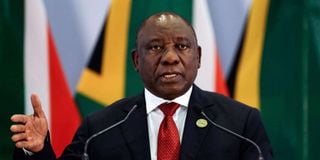Covid-19 'red list': South Africa warns UK

South African President Cyril Ramaphosa.
What you need to know:
- Travellers from South Africa or other countries on the ‘red list’ are barred from entering the UK.
The Southern Africa Tourism Services Association (SATSA) has warned the UK of “irreparable harm to a relationship with a key ally and trading partner” if South Africa is kept on the ‘red list’.
In a revised list announced on Friday, the UK removed eight countries from its ‘red list’ of travel restrictions, but South Africa remained.
Under the travel rules, travellers from South Africa or other countries on the ‘red list’ are barred from entering the UK.
Only British and Irish nationals or those with residency status will be allowed entry into the UK if coming from a ‘red list’ country or territory.
But they are still subject to very strict and costly quarantine regulations which have been viewed as discouraging to tourists who wish to visit South Africa.
“No scientific evidence”
The latest development comes as South Africa’s number of international visitors rises.
Traditionally, UK accounts for the highest number of tourist arrivals in South Africa and inbound tourism body SATSA described the latest move as a “kick in the teeth.”
“This is a kick in the teeth for 1.5 million South African tourism workers who were relying on UK visitors this spring. There isn’t a shred of scientific evidence to support keeping South Africa on the ‘red list’,” SATSA said as it has launched an online petition to have South Africa removed from the UK ‘red list’.
“The only conclusion left is that the UK government has an irrational fear of South Africa which is prejudicing decision-making. They need to urgently reconsider this classification to avoid irreparable harm to a relationship with a key ally and trading partner.”
Previous talks
Earlier in September, the South African government was pushing to have the UK ease travel restrictions between the two countries.
South Africa’s Minister of International Relations and Cooperation Naledi Pandor held talks with the UK’s then foreign secretary Dominic Raab, who is now Justice secretary.
In her submissions to Mr Raab, Minister Pandor stated that “Lindiwe Sisulu (South Africa’s Tourism minister) and I are conscious that the UK is South Africa’s number one source of long-haul tourism in the world, a position it has not relinquished for the past 18 years.”
The latest development comes as Covid-19 cases in South Africa drop.
Interestingly, Turkey, which was struck off the UK’s ,red list’, has been experiencing a spike in infections.
Costly move
Travel restrictions between South Africa and the UK have existed for the past nine months and are regarded as punitive measures which discourage tourism.
A recent report published by the World Travel and Tourism Council (WTTC) showed that the South African economy has been losing $12 million every week it has remained on the UK’s red list.
“The impact the UK’s traffic light system imposes on ‘red list’ countries is not only damaging the travel and tourism sector, but also economies around the world,” said WTTC senior vice-president Virginia Messina.
“Our data shows that every day South Africa remains on the UK’s ‘red list’, the country faces losing millions of dollars, effectively delaying the global socio-economic recovery.”
Besides the effects on trade and tourism, South Africans living in the UK have been hesitating to travel home for pressing commitments like funerals or visiting sick family members due to the punishing quarantine costs they have to endure upon return to the UK.
Marc Mendelson, a professor of Infectious Diseases at the University of Cape Town, described the UK's decision to keep South Africa on the ‘red list’ as “absolutely disgusting”.
Tulio de Oliveira, director of the KwaZulu-Natal Research Innovation and Sequencing Platform, said the decision was “unscientific”.





